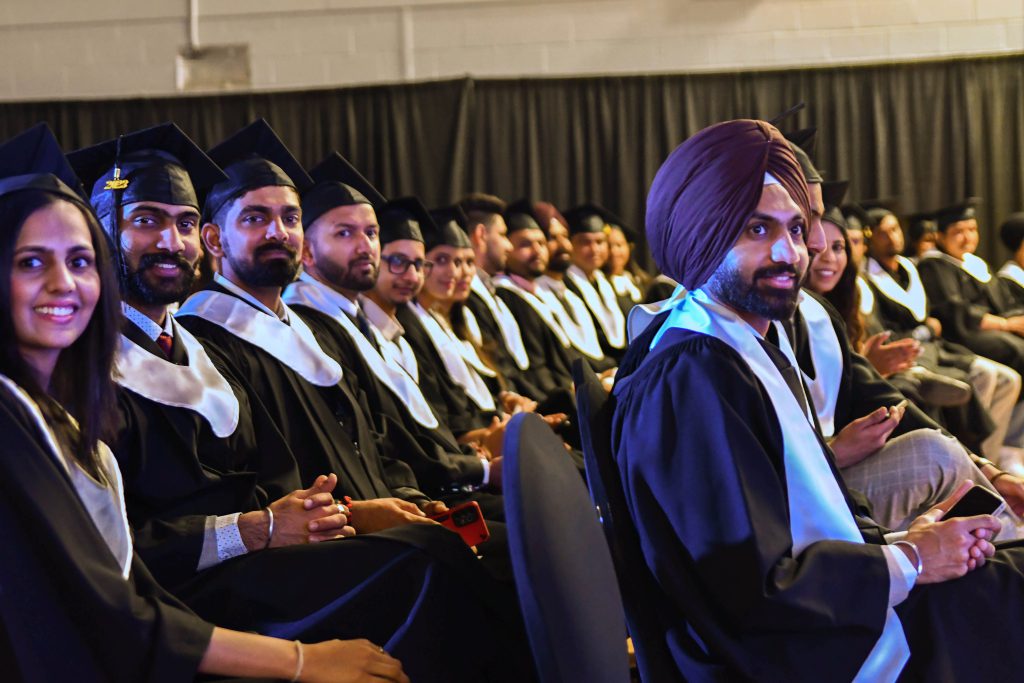Student Success & The Northern Experience
Pre-Health Sciences can provide you with the opportunity to study subject areas relevant to health career programs at Northern College and affiliate partners and instill an appreciation of the professional roles, responsibilities and academic requirements of health care disciplines.
The goal of the program is to prepare individuals for their chosen health career program. Completing both semesters of this program will provide the prerequisites for entry into the Bachelor of Science in Nursing, Practical Nursing, and Paramedic programs.
Does this program sound like a good fit for you?
Connect with us to learn more.
Course Information
2024-2025 Academic Year
Semester 1
In this course, students will learn essential skills for success in college and the workplace. This course focuses on developing and strengthening oral and written communication skills, and critical thinking ability. During this course, students will engage in a variety of forms of communication with a focus on upholding the principles of academic integrity. Students will develop the skills necessary to create discipline-specific documents, practice business etiquette and professionalism, and apply critical thinking strategies to practical scenarios. Upon successful completion of this course, students will be able to plan and draft concise, coherent and well-organized writing assignments that are tailored to specific audiences and purposes.
42 Hours
Improving your knowledge and understanding of the history of the Indigenous peoples of what we now call Canada is an important step to enable Indigenous and non-Indigenous people, organizations, and communities to work together more respectfully. Throughout this course you will have the opportunity to learn, discuss and reflect about many topics that are relevant in the learning journey towards reconciliation.
42 Hours
This course will enable the student to develop a foundation in the fundamental concepts of Biological Sciences within the context of the human body. The student will study and explore Cell Biology, Genetics, Evolution and Microbiology with an emphasis on understanding the underlying concepts and principles and applying them to the human body. The student will also investigate future careers in health sciences and other high affinity fields and identify appropriate post-secondary programs to prepare for chosen career.
56 Hours
This course will enable students to deepen their understanding of chemistry through the study of atomic and molecular structure, chemical systems and equilibrium, electrochemistry, energy changes and rates of reactions, states of matter, solutions, and gases. These topics will have a strong health science emphasis and will provide students with a chemistry perspective of health and the human body.
56 Hours
By the end of this course, students will have demonstrated the ability to evaluate a variety of arithmetic and algebraic expressions and apply these principles to typical situations that arise in the health care fields. Concepts studied include numeracy fundamentals; systems of measurement and dimensional analysis; algebra, with an emphasis on analytical techniques; and evaluating systems of linear equations. Students will develop essential critical thinking and problem-solving skills through exposure to application problems, including dosage calculations, solution dilutions, concentrations, and pH.
42 Hours
This course provides an introduction to selected concepts and theories of psychology including the history of and major trends in psychology. This course provides a grounding in the concepts related to biology and behaviour, including brain function, stress, sensation, perception, consciousness, and memory. This course also provides an introduction to the topics of conditioning and learning, cognition and creativity, intelligence, motivation and emotion, gender and sexuality, personality, social behaviour, and human relations. Abnormal psychology related to psuchological disorders and therapies is introduced.
42 Hours
Semester 2
Students will explore and examine the many layers of diversity that surround individuals and identifiable groups in society and they will see how these many layers contribute to a rich, diverse Canadian cultural landscape. As part of this examination, students will have the opportunity to reflect on their personal attitudes, assumptions and views toward diverse population groups.
As a brief introduction, students will begin developing their understanding of diversity by identifying, discussing, and defining core terminology like privilege, cultural competence, and cultural safety. Students will enhance their knowledge and understanding of diversity by looking at origins of differences among various population groups in Canada and by looking at society’s attitudes associated with Canadian Regionalism, demographic trends, First Nations peoples, immigration, and various other established minority groups. Also, learners will become aware of government policies and influence on certain segments of Canadian society and its role in dealing with social inequalities. Finally, students will look at and reflect on the media’s role in perpetuating stereotypes and swaying personal views of diversity in Canada.
42 Hours
By the end of this course, students will have demonstrated the ability to understand and apply the core principles of probability and statistics. Concepts studied include populations and samples; sampling techniques; frequency distributions; skewness, location, and measures of central tendency; variance and standard deviations; probability calculations and distributions; the Empirical Rule; z-scores and the Central Limit Theorem. Students will use numerical methods along with graphs, charts, and tables to effectively describe data, calculate the empirical and theoretical probability of simple events using key rules of probability, and apply descriptive and inferential statistics to applications from the health care fields.
42 Hours
This course will enable the learner to build upon the foundation of the fundamental concepts of Biological Sciences covered in Human Biology I. The learner will apply those concepts from their study of Cell Biology, Genetics, Evolution, and Microbiology to the study of the anatomy and physiology of the human body. In the context of the study of the various organ systems, the learner will be introduced to common pathologies with examples taken from current scientific research. The emphasis will be on understanding the underlying concepts and principles, and applying them to a diversity of body systems. The student will apply information learned within this course to their ongoing investigation of future careers in health sciences.
56 Hours
Chemistry II will enable the learner to build upon the foundation of the fundamental concepts of chemistry covered in Chemistry I. The learner will apply the concepts from Chemistry I to the study of organic chemistry and biochemistry. The focus is on the understanding of the chemical basis of life. Topics covered will include hydrocarbons, derivatives of hydrocarbons, and biochemistry. Connections are regularly made between the principles of organic and biochemistry covered in this course and the content of Human Biology I and II. Special emphasis will be placed on the application of these concepts to the health and biosciences.
56 Hours
This course is a rigorous introduction to physics which will enable the student to develop a foundation in the fundamental concepts of physics. The student will apply critical thinking and problem-solving techniques to physics concepts related to the health science field. The student will conceptually and quantitatively study concepts including kinematics, forces, work, energy and power, fluids and pressure, nuclear physics, electrostatics, magnetism, waves and electromagnetic radiation. This course will provide the student with a physics based perspective of health and the human body.
56 Hours
Career Ready Graduates
Articulation Agreements
A number of articulation agreements have been negotiated with universities and other institutions across Canada, North America and internationally. These agreements are assessed, revised and updated on a regular basis. Please contact the program coordinator for specific details if you are interested in pursuing such an option.
Canadian Field of Study/CIP Code List
CIP Code: 51.1199
International students: check the Canadian Field of Study/CIP Code List to see if your program is eligible for the Post-Graduation Work Permit (PGWP).
- Examine biological concepts, processes and systems of the human body, including genetics and epigenetics, as well as the structure, function and properties of the molecules of life, cells, tissues and organ systems in relation to homeostasis, physical development and health.
- Examine concepts, processes and systems of chemistry, including atomic and molecular structure; quantities in chemical reactions; solutions and solubility; acids and bases; as well as organic chemistry and biochemistry in relation to health and the human body.
- Solve numeric problems and interpret data related to health sciences and other science-related fields using mathematical concepts, including algebra and probability, along with descriptive and inferential statistics.
- Use health sciences and other science-related language and terminology appropriately to communicate clearly, concisely, and correctly in written, spoken, and visual forms.
- Prepare a personal strategy and plan for academic, career and professional development in the health sciences or other science-related fields.
- Investigate health sciences and science-related questions, problems and evidence using the scientific method.
- Examine fundamental physical laws and concepts and their application to health sciences and other science-related fields.
Career Opportunities
Graduates may find employment opportunities in public and private agencies and institutions including family homes, community-based services, residential and custody settings.
Admissions Information & Requirements
Admission Requirements
- Ontario Secondary School Diploma (OSSD)
- Grade 12 English (C, U)
- Grade 11 Math (C, M, U) (Preferably Functions and Relations or equivalent)
Or equivalent
It is strongly recommended that students entering this program have access to the Internet.
In this program, Biology, Chemistry and Mathematics will provide students with a solid background to satisfy the entrance requirements for Northern’s Nursing Baccalaureate, RPN, Paramedic, Massage Therapy and Medical Laboratory Technician programs.
A 3.0 GPA in this program is a requirement to be admissible to the BScN program.
Additional Requirements for International Students
In addition to the admission requirements, international students must have proof of English Proficiency and meet the requirements below.
1. Proof of Senior High School Diploma/Certificate with a 50% grade equivalent for Mathematics
2. English Proficiency (we will require one of the following):
- IELTS Academic (International English Language Testing System – minimum overall band of 6.0 must be achieved with no individual Band score under 6.0
- TOEFL (Test of English as a Foreign Language) – Computer based overall minimum score of 79
- PTE (Pearson Test of English) Academic – Graduate Diploma: 58+
If your country of citizenship has English as its official language, we may accept alternate proof of English Proficiency.
All educational documents must be submitted in English and will be dependent on the country of citizenship.
For more information, please contact admissions@northern.on.ca.
Tuition, Fees & Payments
The tuition and fees information is typically updated yearly for the upcoming Academic Year in May. The amounts are for the full academic year.
Amounts may be based on last years tuition and fees and are subject to change.
If you are a current student, please refer to your Student Account or see a Student Services Clerk for the most up-to-date information.
Tuition
Domestic: $2,720.56
International: $15,257.86
Ancillary Fees
Ancillary fees vary by campus and support aspects of your experience as a Northern College student, such as Student Associations, Athletic Facilities, and Health Benefits.Ancillary fees are paid in full for the entire academic year in the first semester.
Please see Detailed Ancillary Fees for more information.
| Ancillary Fees by Campus (2024-25) | Domestic | International |
| Timmins (PC) | $945.50 | $1,558.00 |
| Distance (CK, CH, OL) | $772.50 | N/A |
Find Your True North.
At Northern College, you’re a part of a community.
From your teachers to support staff and administrators, we are all here to help you get an education and make some lasting connections along the way.
Your success is incredibly important to you, so we provide student supports to help you achieve your goals. From study assistance and accessibility services to mental health supports and financial aid, we’ve got you covered.
Each of Northern’s campuses boasts exercise facilities, a gym, cafeteria, study areas and a library – places that you can go to help keep you focused as you work your way through your studies. The communities we call home are incredible places, filled with amazing people and things to do.


Does Northern College sound like a good fit for you?
Here’s how to take your first steps on your new exciting and rewarding career path.
